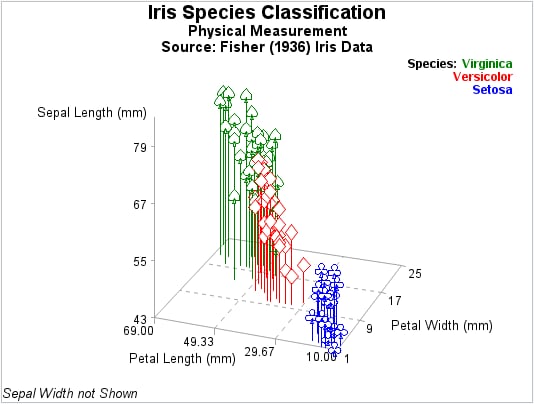G3D Procedure
Example 5: Generating a Scatter Plot with Modified Shapes
| Features: |
SCATTER statement
|
| Other features: |
NOTE statement DATA Step |
This scatter plot modifies
the results of measuring the petal length, petal width, and sepal
length for the flowers of three species of irises. It uses a DATA
step to add a color variable and a shape variable to the data set,
shapes to distinguish iris species, colors to distinguish iris species,
and a NOTE statement to simulate a legend.
Program
goptions reset=all border;
title1 "Iris Species Classification"; title2 "Physical Measurement"; title3 "Source: Fisher (1936) Iris Data"; footnote1 j=l "Sepal Width not Shown";
data iris; set sashelp.iris; length color shape $8.; if species="Setosa" then do; shape="club"; color="blue"; end; if species="Versicolor" then do; shape="diamond"; color="red"; end; if species="Virginica" then do; shape="spade"; color="green"; end; run;
proc g3d data=iris;
note j=r f="Albany AMT/bo" "Species: " c=green "Virginica "
j=r c=red "Versicolor "
j=r c=blue "Setosa ";
scatter PetalLength*PetalWidth=SepalLength/
color=color
shape=shape
size=1.5;
run;
quit;
Program Description
title1 "Iris Species Classification"; title2 "Physical Measurement"; title3 "Source: Fisher (1936) Iris Data"; footnote1 j=l "Sepal Width not Shown";

